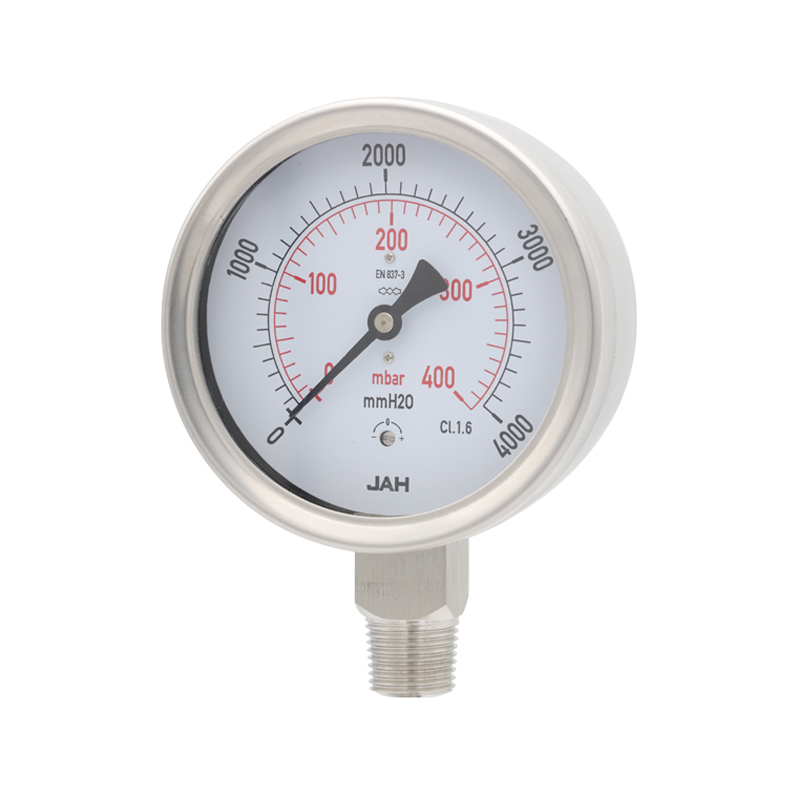
Juil . 31, 2024 21:34 Back to list
Exploring the Features and Applications of Low Range Differential Pressure Gauges in Various Industries
Understanding Low Range Differential Pressure Gauges
Low range differential pressure gauges are essential instruments in various industries, including pharmaceuticals, food processing, HVAC systems, and oil and gas. These gauges measure the difference in pressure between two points in a system, providing critical data for monitoring and controlling processes. In this article, we will explore the significance, functionality, and applications of low range differential pressure gauges.
What is a Differential Pressure Gauge?
A differential pressure gauge measures the pressure difference between two points, which can indicate flow rates, filter conditions, or levels of fluid in a vessel. These gauges are equipped with two pressure ports—one for high pressure and another for low pressure. The gauge displays the difference, providing important insights into the operational status of equipment and systems.
Importance of Low Range Differential Pressure Gauges
Low range differential pressure gauges are tuned to detect small pressure variations within a limited range. This specificity is crucial in systems that deal with low-flow processes or delicate operations. For instance, in pharmaceuticals, where precise measurements are essential for product quality and compliance, these gauges help ensure that filtration systems or reactors operate within optimal pressure limits.
Moreover, in HVAC systems, low range gauges monitor the performance of filters and ducts, ensuring efficient airflow and preventing energy wastage. By detecting small pressure drops, facility managers can proactively service or replace filters, enhancing indoor air quality and system efficiency.
Features of Low Range Differential Pressure Gauges
1. Sensitivity Designed to detect slight variations in pressure, low range differential pressure gauges can measure changes as small as a few inches of water column (inWC). This sensitivity makes them ideal for monitoring applications where precision is paramount.
2. Calibration Many low range gauges come with the option for calibration, allowing users to ensure accuracy over time. This is essential in applications that require adherence to strict regulatory standards.
low range differential pressure gauge jah

3. Material Compatibility Depending on the application, these gauges can be constructed from various materials, including stainless steel, plastic, or brass. Choosing the right materials helps ensure durability and resistance to corrosive environments.
4. Display Types They can feature analog or digital displays. Digital gauges often provide enhanced readability and additional functionalities, such as the ability to log data or connect to external monitoring systems.
Applications in Various Industries
1. Pharmaceuticals In cleanrooms and pharmaceutical manufacturing, maintaining specific pressure differentials is critical to preventing contamination. Low range differential pressure gauges monitor air filters and sterile environments to ensure compliance with safety standards.
2. Food and Beverage These gauges assist in monitoring pressure drops across filters and pumps. Maintaining optimal pressure is vital for avoiding contamination and ensuring product quality.
3. HVAC Systems Low range differential pressure gauges play a crucial role in diagnosing issues within ductwork and filter systems. They help maintain proper airflow, contributing to energy efficiency and comfort in building environments.
4. Oil and Gas In refining processes, differential pressure gauges help monitor the performance of separators and filters, ensuring operational efficiency and safety in sensitive operations.
Conclusion
Low range differential pressure gauges are indispensable tools across various industries, providing critical measurements that affect safety, compliance, and efficiency. Understanding their functionality and applications helps industries maintain optimal operations and achieve high standards of quality. As technology advances, these gauges will continue to evolve, offering even more precise measurements and integration into smart monitoring systems, further enhancing their value in modern industrial applications.
-
High-Precision 5 Valve Manifold Differential Pressure Gauge Suppliers
NewsApr.29,2025
-
High-Precision Diaphragm Vacuum Pressure Gauges Manufacturers & Quotes
NewsApr.29,2025
-
Omega Differential Pressure Gauges High Accuracy & Durability
NewsApr.28,2025
-
Low Pressure Differential Pressure Gauges Precision Solutions & Quotes
NewsApr.28,2025
-
Digital Diaphragm Pressure Gaauge Precision Measurement & OEM Quotes
NewsApr.28,2025
-
Differential Pressure Gauge China Price High-Accuracy & Best Quotes
NewsApr.28,2025
